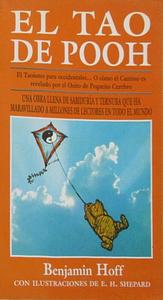You need to sign in or sign up before continuing.
Take a photo of a barcode or cover
Charming bit of nonsense which I read as I was rereading the Tao Te Ching. It does actually give a fairly good idea of what it's about. Rather too twee though.
funny
informative
reflective
Probably an automatic 5 stars for me simply because I have such strong positive feelings toward Pooh, just to make that clear. On top of the nostaliga factor, I found this book to be calming and full of good reminders to live life simply and strive for happiness instead of superficial goals. I thought this novel was cute and successful at getting its message across.
I now know more about Taoism than I did before I read this, but only a little, and that's only because I knew basically nothing about it to begin with. Mostly this was nothing more than a fairly preachy, probably useless motivational text. That isn't to say Taoism is stupid, or anything like that. I definitely liked some of the ideas so briefly outlined here. I'd just rather read about them from a different source, like maybe Lao-tse himself. Honestly the best parts were the excerpts from the original Pooh books. I need to read some A.A. Milne.
I don't know enough about Taoism or Winnie the Pooh in order to have really followed along and gotten much out of this. Also, for a book that tries to teach religion/spirituality through pop culture, it's pretty dogmatic.
One book I will read again and again to ground myself and fetter out the unnecessary from my attitude and mindset.
inspiring
reflective
fast-paced
lighthearted
reflective
slow-paced
So, here we are, folks—where the world’s most adorably clueless bear is suddenly a sage philosopher. Because nothing screams “ancient Chinese wisdom” like a honey-obsessed stuffed animal who can’t tell time.

Now, don’t get me wrong, I love Winnie-the-Pooh as much as the next person with a soft spot for childhood nostalgia. But trying to convince me that Pooh is somehow the embodiment of Taoist principles? Yet here we are, with Benjamin Hoff suggesting that the path to inner peace is paved with hunny pots and lazy afternoons doing, well, nothing. Which, I guess, is kinda the point of Taoism? Or at least it is when you filter it through a bear who can’t even spell “honey” correctly.
Benjamin Hoff, bless his optimistic heart, spends the entire book drawing parallels between Pooh’s bumbling antics and the teachings of Laozi. According to Hoff, Pooh’s lack of critical thinking, his constant wandering, and his inability to plan more than five seconds ahead are all signs of a life lived in harmony with the Tao. Or maybe, just maybe, Pooh’s just not that bright? But hey, potato, po-tah-to.
And let’s talk about Taoism for a second. It’s all about going with the flow, living in the moment, and not getting caught up in the material world. So naturally, we turn to a bear who gets stuck in a honey jar as our spiritual guide.
The book is filled with Hoff’s attempts to explain Taoism in the simplest terms possible, which somehow only makes it more confusing. And sure, I get that he’s trying to make ancient philosophy accessible, but using a bear of very little brain to do it? I’m sure Laozi is somewhere in the afterlife, shaking his head and saying, “That is not what I meant.”
The book tries to make some lofty points about simplicity and going with the flow, but honestly, it feels like a stretch. You can almost hear the gears grinding as Hoff tries to make Taoist principles fit into Pooh’s bumbling adventures. It’s like trying to learn quantum physics from Elmo—cute idea, but I’m not sure I’m any wiser for it. It’s like Hoff is constantly winking at the reader, as if to say, “Isn’t it clever how I’m turning a silly bear into a Zen master?” But after a while, the novelty wears off, and you’re left wondering if you’ve actually learned anything about Taoism.
By the end, I wasn’t sure if I’d learned more about Taoism or just spent a few hours reading an overly philosophical fanfic of Winnie-the-Pooh. And while I appreciate the effort, I’m not convinced that Pooh’s love of honey and napping holds the key to the universe. To be fair, the book does have its charming moments, and if you’re a die-hard Pooh fan or someone who thinks philosophy could use a little more whimsy, you might enjoy it. If you’re looking for deep spiritual guidance, maybe stick to the original Tao Te Ching.

Now, don’t get me wrong, I love Winnie-the-Pooh as much as the next person with a soft spot for childhood nostalgia. But trying to convince me that Pooh is somehow the embodiment of Taoist principles? Yet here we are, with Benjamin Hoff suggesting that the path to inner peace is paved with hunny pots and lazy afternoons doing, well, nothing. Which, I guess, is kinda the point of Taoism? Or at least it is when you filter it through a bear who can’t even spell “honey” correctly.
Benjamin Hoff, bless his optimistic heart, spends the entire book drawing parallels between Pooh’s bumbling antics and the teachings of Laozi. According to Hoff, Pooh’s lack of critical thinking, his constant wandering, and his inability to plan more than five seconds ahead are all signs of a life lived in harmony with the Tao. Or maybe, just maybe, Pooh’s just not that bright? But hey, potato, po-tah-to.
And let’s talk about Taoism for a second. It’s all about going with the flow, living in the moment, and not getting caught up in the material world. So naturally, we turn to a bear who gets stuck in a honey jar as our spiritual guide.
The book is filled with Hoff’s attempts to explain Taoism in the simplest terms possible, which somehow only makes it more confusing. And sure, I get that he’s trying to make ancient philosophy accessible, but using a bear of very little brain to do it? I’m sure Laozi is somewhere in the afterlife, shaking his head and saying, “That is not what I meant.”
The book tries to make some lofty points about simplicity and going with the flow, but honestly, it feels like a stretch. You can almost hear the gears grinding as Hoff tries to make Taoist principles fit into Pooh’s bumbling adventures. It’s like trying to learn quantum physics from Elmo—cute idea, but I’m not sure I’m any wiser for it. It’s like Hoff is constantly winking at the reader, as if to say, “Isn’t it clever how I’m turning a silly bear into a Zen master?” But after a while, the novelty wears off, and you’re left wondering if you’ve actually learned anything about Taoism.
By the end, I wasn’t sure if I’d learned more about Taoism or just spent a few hours reading an overly philosophical fanfic of Winnie-the-Pooh. And while I appreciate the effort, I’m not convinced that Pooh’s love of honey and napping holds the key to the universe. To be fair, the book does have its charming moments, and if you’re a die-hard Pooh fan or someone who thinks philosophy could use a little more whimsy, you might enjoy it. If you’re looking for deep spiritual guidance, maybe stick to the original Tao Te Ching.
A little hard to follow, I might add. In the end, the message is clear, and that message is to be you and the world is your guide to everything.





